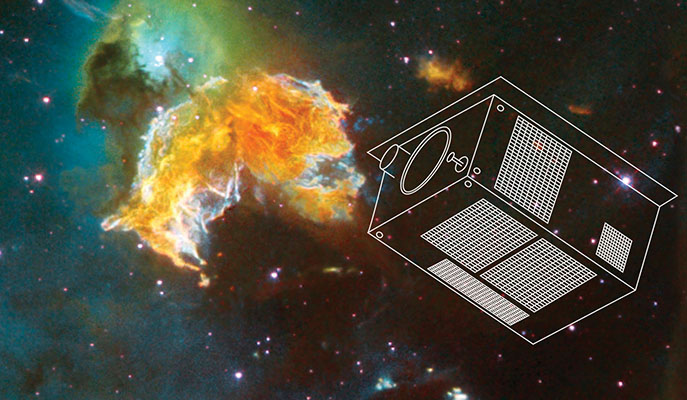עיתונאיות ועיתונאים, הירשמו כאן להודעות לעיתונות שלנו
הירשמו לניוזלטר החודשי שלנו:

Weighing in at just about 160 kg, a new type of a scientific satellite is planned to be built in Israel over the next four years, with a projected launch date of 2023. The satellite, known as ULTRASAT, will carry a telescope designed to observe the Universe as it has not been seen it before: It will operate in a range of light that is normally invisible to us (ultraviolet) with a very large field of view. “This unique configuration will help us answer some of the big questions in astrophysics,” says the Weizmann Institute's Prof. Eli Waxman, ULTRASAT’s principal investigator. These include the formation process of dense neutron stars that merge and emit gravitational waves, how supermassive black holes rule their neighborhoods, how stars explode, where the heavy elements in the Universe come from, the properties of stars that could have habitable planets and more.
The Weizmann Institute of Science (WIS) and the Israel Space Agency (ISA) recently agreed to initiate work on the project this coming September; in parallel they are conducting an effort to secure the budget for the entire project. This agreement was reached just as the German DESY Research Center of the Helmholtz Association pledged its support and cooperation for the initiative. Negotiations are also under way with other major space agencies to get ULTRASAT off the ground. The project is expected to cost some $70 M over a projected four years of detailed planning, construction and launch.
The ULTRASAT spacecraft will be constructed by the Israel Aerospace Industries and Elop electro-optics/Elbit Systems, “putting Israel – and Israeli scientists and engineers – at the forefront of a global movement to explore the Universe with small, affordable satellites,” says ISA’s director Avi Blasberger. ISA’s chairman Prof. Itzhak Ben Israel adds: “Israeli researchers are embarking on an exciting and challenging journey to put ULTRASAT into orbit.” “A small country – and a small satellite – can produce big results, even in exploring the wonders of distant outer space,” says WIS president, Prof. Daniel Zajfman.
Prof. Eli Waxman’s research is supported by the Schwartz/Reisman Institute for Theoretical Physics; and the Nella and Leon Benoziyo Center for Astrophysics. Prof. Waxman is the incumbent of the Max Planck Professorial Chair of Quantum Physics.